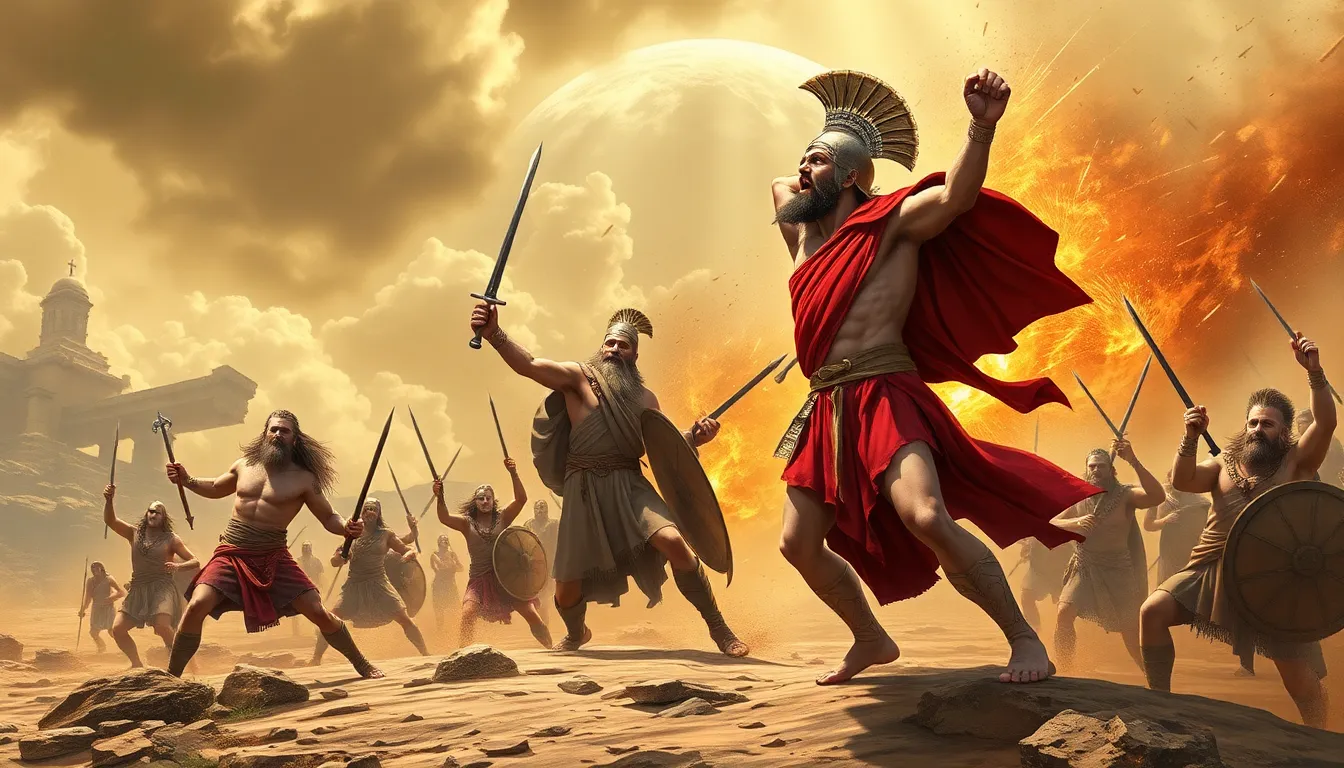The Role of the War Cry in Greek Warfare: Myths of Courage
I. Introduction
The concept of a war cry in the context of Greek warfare refers to the loud, often rallying shouts made by soldiers before and during battle. These cries served multiple purposes, acting as both a psychological weapon and a means of communication among troops. The importance of courage in ancient Greek military culture cannot be overstated; bravery was not only celebrated but was also seen as essential for success in battle. This article will explore the myths and realities surrounding war cries in Greek warfare, examining their historical context, composition, psychological impact, and legacy.
II. Historical Context of Greek Warfare
The ancient Greek world was characterized by a collection of city-states, each with its own military practices, cultural norms, and political structures. Prominent city-states such as Athens, Sparta, and Thebes had distinct approaches to warfare, but all recognized the significance of morale in combat. Psychological warfare was often as important as physical prowess in determining the outcomes of battles. War cries played a crucial role in this dynamic.
Some notable battles where war cries were prominent include:
- The Battle of Marathon (490 BC)
- The Battle of Thermopylae (480 BC)
- The Battle of Salamis (480 BC)
In these engagements, the sounds of battle, including the war cries of soldiers, helped to bolster morale, intimidate opponents, and create an atmosphere of unity among troops.
III. The Composition and Function of War Cries
War cries in ancient Greece often consisted of simple phrases, rallying calls, or shouted exhortations. Common themes included invoking the gods, calling for strength, and promoting unity among the soldiers. Examples of common phrases include:
- “For Honor!”
- “To Victory!”
- “By the Gods!”
The intended emotional impact of these war cries was multifaceted. They aimed to uplift the spirits of the soldiers while simultaneously instilling fear in the hearts of their enemies. The sound of a united front shouting in unison could create an overwhelming sense of power and determination.
Additionally, the war cry played a vital role in maintaining unit cohesion and discipline. By synchronizing their voices, soldiers reinforced their bonds and reminded each other of their shared purpose and bravery.
IV. Mythologizing the War Cry: Cultural Representations
War cries were not only a battlefield phenomenon but also a significant element in Greek literature and drama. Epic poems like Homer’s “Iliad” and dramatic works by playwrights such as Aeschylus often depicted the fervor and courage encapsulated in battle cries. The war cry became a symbol of heroism and valor, representing the ideal qualities of a Greek warrior.
Mythological figures associated with war, such as Ares and Athena, further influenced the perception of war cries. Ares, often seen as the embodiment of chaotic warfare, and Athena, representing strategic warfare, both contributed to the cultural understanding of courage and battle. Their narratives often included the rallying cries of heroes, emphasizing the importance of such sounds in achieving glory and victory.
V. Case Studies of War Cries in Battle
Examining specific battles can provide insight into the tangible effects of war cries on morale and outcomes.
A. The Battle of Marathon
During the Battle of Marathon, Athenian soldiers reportedly shouted a war cry that invoked the gods, which instilled both confidence and fervor. The psychological impact of their cries contributed to their surprising victory over the numerically superior Persian forces.
B. The Battle of Thermopylae
The legendary stand of the 300 Spartans at Thermopylae is famously associated with their war cries. The Spartans shouted challenges to their foes, embodying courage and defiance. These war cries became a symbol of heroism, highlighting the interplay between fear and bravery in the face of overwhelming odds.
C. Other Significant Battles
In other significant battles, such as the naval Battle of Salamis, the war cries of sailors and soldiers were crucial in maintaining morale amid chaos. The sounds of battle cries were instrumental in coordinating attacks and fostering a sense of unity among the participants.
VI. The Psychological Aspect of War Cries
Understanding the psychological impact of sound can deepen our appreciation of the role of war cries in Greek warfare. Research indicates that sound significantly affects human psychology, influencing emotions and behavior.
War cries served to:
- Intimidate opponents: The sheer volume and unity of a war cry could instill fear in enemy ranks.
- Embolden soldiers: Hearing their comrades shout in unison could boost morale and foster a sense of courage.
The interplay between fear and courage was complex; while war cries could evoke fear in enemies, they also served as a reminder of bravery for the soldiers, reinforcing their resolve to fight.
VII. Legacy and Influence of War Cries in Modern Warfare
The legacy of Greek war cries can be seen in modern military practices. While the exact nature of war cries may have evolved, the principles of psychological tactics remain relevant today. Modern military chants and battle cries often aim to unify troops and foster a sense of camaraderie.
Key comparisons include:
- Ancient Greek war cries were often spontaneous and deeply personal, whereas modern military chants are typically structured and standardized.
- Both serve to enhance morale and intimidate opponents, demonstrating the enduring nature of psychological warfare.
The cultural memory surrounding war cries continues to influence perceptions of valor and bravery in contemporary society, as the stories of ancient heroes resonate through time.
VIII. Conclusion
In conclusion, the significance of war cries in Greek warfare transcends mere sound; they encapsulated the courage, unity, and psychological strategies that were vital for success in battle. The myths surrounding these cries have shaped the understanding of heroism in Greek society and continue to influence modern perceptions of valor. As we explore the intersection of culture, mythology, and warfare in history, we gain insights into the profound impact that such practices have had on human behavior and societal values.




